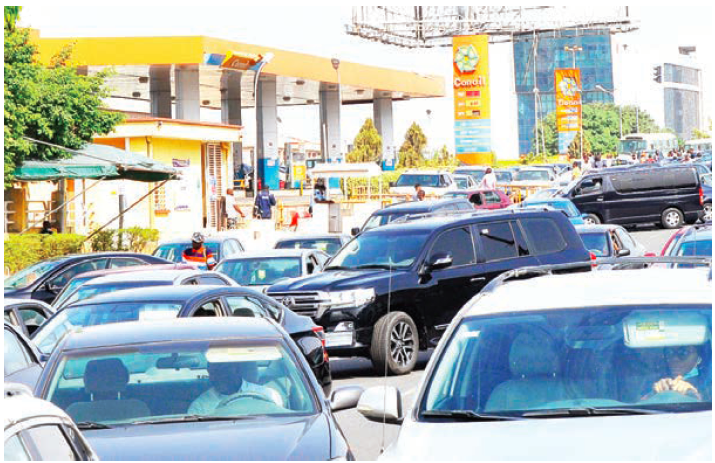In the past one month, Nigerians have been subjected to untold hardships caused by the lingering petrol scarcity; affecting economic activities and making the already trying times in the country more difficult for many people. When the current petrol scarcity reared its ugly head in October this year, the Nigerian Midstream and Downstream Petroleum Regulatory Authority (NMDPRA) said the fuel scarcity in Abuja and other states in the North was caused by flooding in Lokoja, Kogi State. While long fuel queues appeared in most filling stations in Abuja, many others were not selling the product. This was at the peak of this year’s rainy season. In a statement, the NMDPRA said water has submerged the greater part of Lokoja including the highway leading to Abuja; a development that grounded all vehicular movements along that route to a halt.
This, NMDPRA said, affected distribution of petroleum products to the Federal Capital Territory (FCT) and its environs. “The authority wishes to reiterate its commitment to Nigerians to ensure seamless supply and distribution of petroleum products nationwide”, the statement by the NMDPRA added. While the NMDPRA assured the public that it was working to ensure the availability of sufficient petroleum products inland, it also advised Nigerians to avoid panic buying at fuel stations. The authority further warned marketers to desist from hoarding the product so as not to inflict hardship on Nigerians.
- FG deploying Agro-rangers for improved security on farms – Minister
- NIGERIA DAILY: Commercial Activities Crippled, As Bus Drivers Strike In Lagos State
Were pipelines being used to pump petroleum products to various depots across the country, which is the purpose for which they were designed, the far-fetched excuse of flooding which the NMDPRA claimed was responsible for the current scarcity wouldn’t have been an issue. Even then, the current awkward situation could have been averted if efforts were made to divert petroleum tankers to other routes leading to the FCT, which had been severely hit by fuel scarcity. Moving petroleum products by road has negative implications, including gradual dilapidation of the highways and the payment for the freight cost of the product; the basis for which government claims to be paying subsidy in billions of naira.
Many lives and property worth billions of naira have been lost to fire ignited by accidents involving petroleum tankers. This, over decades, has become a nightmare on Nigerian highways. Government, therefore, is urged to re-activate the pipelines and end the movement of products by road.
Soon after floods receded in Lokoja while petrol scarcity continued to linger and bite harder in the FCT and its environs, the President of the Independent Petroleum Marketers Association of Nigeria (IPMAN), Debo Ahmed, said the situation has continued to persist because of the supply gap created by the blockade in Lokoja. He affirmed that there was enough product in the depots and that the lingering scarcity was only caused by the break in supply of the product.
When the scarcity extended further from the FCT to Lagos where roads were not submerged by flooding, authorities responsible for the supply of petroleum products substituted their earlier excuse with a new but untenable reason to explain the situation. This time, the National Operations Controller of IPMAN, Mr Mike Osatuyi, attributed the scarcity to unsteady supply in the past few weeks; another inexcusable reason. He told reporters that as a result of the unsteady supply, depot prices had risen to between N175 and N180 per litre in Lagos and its environs.
According to Osatuyi, “our members who find it difficult to get the product pay between N175 and N185 per litre. Consequently, we are compelled to sell at higher pump prices in order to cover cost.” While most filling stations in Lagos, especially those of independent marketers, were not selling the product, others who had it in commercial stocks were dispensing at various pump prices, ranging between N200 and N250 per litre; much higher than the official rate per litre. The scarcity began in Lagos State last week Monday when long queues emerged at many filling stations.
If the current situation does not change and the fuel scarcity lingers longer, another reason will still be advanced to explain the scarcity. Nigerians are tired of listening to indefensible excuses. Government should come clean and stop these endless lies before their list of ‘cock and bull stories’ is exhausted. It is incredible that Nigerians are still being subjected to the phenomenon of fuel scarcity long after the Petroleum Industry Act (PIA) has been signed into law. More importantly, the Nigerian National Petroleum Corporation Limited (NNPCL) should keep its promise of ending the importation of petroleum products by March 2023 when the moribund refineries would have come back to life and the need to move products would not be there.

 Join Daily Trust WhatsApp Community For Quick Access To News and Happenings Around You.
Join Daily Trust WhatsApp Community For Quick Access To News and Happenings Around You.


